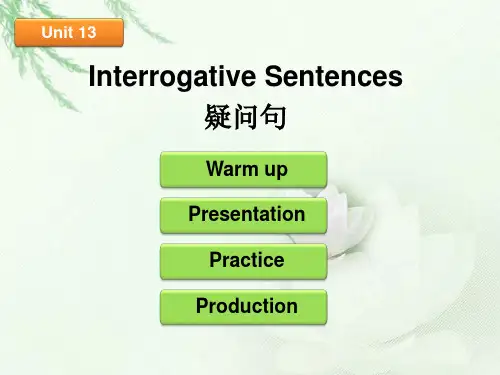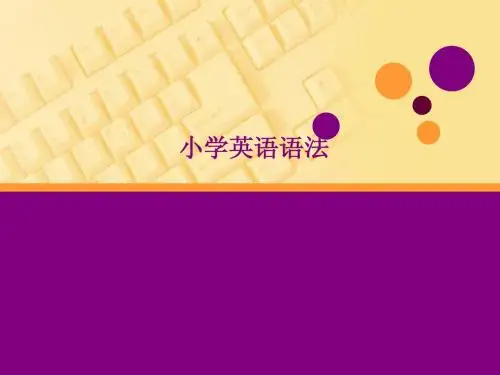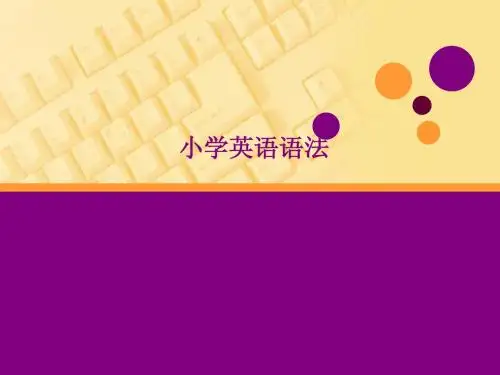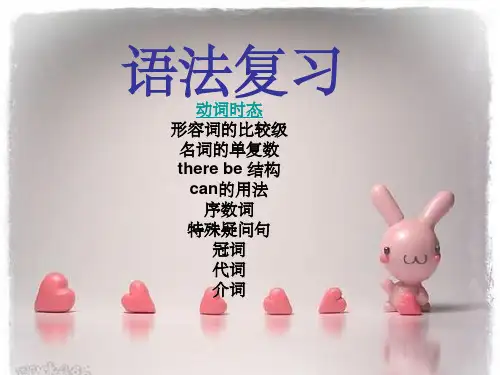小学英语语法---一般疑问句和特殊疑问句(ppt课件)
合集下载
小学英语语法PPT完美版

3. 抽象的概念: the price of success
4. 当of短语中的名词被另一个短语或从句修饰时:
Can’t you look at the book of the boy behind you?
双重所有格
所有’s格结的构形也式可以用于 “of”结构之后,如:a friend of 单m一数y个人f限a称t定h名e词r词’,s末又, 尾出如加现:这t’h种iss 情so况n 是of因m为in在e,一a个f名rie词n前dch通oifld常y-只ocuh用rilsd,’s 以a -cso结us尾in的of单h数e人rs等称等名。词末尾加’s waitress-waitress’s
4. fox _fo_x_e_s___
5. lady __la_d_ie_s____
6. policewomanp_o_li_c_ew_o_m__en_
7. house _h_ou_s_e_s______ 8. photo _p_h_ot_o_s____
9. monkey _m_o_n_ke_y_s____ 10. wife _w_i_ve_s______
11. rose ____________ 12. path __________
13. judge ___________ 14. map ___________
Practise
1. peach_p_e_a_c_he_s___
2. zoo _zo_o_s______
3. glass _g_l_as_s_e_s___
不cIThsh规inlad’则ttresF的nirl’复lsayn数kun人acl称efr名oiefn词dT末oomf尾’sy加ohu’arsss?told
小学英语语法课件-疑问句 (共29张PPT) 全国通用

Presentation Grammar Box
Presentation Grammar Box
Presentation Grammar Box
Presentation Grammar Box
Presentation Grammar Box
Presentation Grammar Box
A. What
B. When
C. Where
D. Which
Production Quiz
Production Quiz
Practice Oral Practice
选择正确的答语。
A. By car. B. Yes, she has. C. Yes, I do. D. It’ s 10 dollars. E. He is my brother.
( E) 1. Who is he? ( A) 2. Do you go home by car or by subway?
Practice
Exercise 2
aren't you
Practice
Exercise 3
Practice
Exercise 4
5
PPrraaccttiicceeI Exercise 1
特殊疑问句 一般疑问句 一般疑问句 一般疑问句 反意疑问句
Practice
Exercise 2
aren't you didn’t she
My grandma has been to many places, _h_a_s_n_’_t _s_h_e_? Lily and Lucy will go to school next week, _w__o_n_’_t _th_e_y__?
小学英语语法复习PPT课件(1)

小学英语语法 三、句型转换: 1. They are doing housework .(分别改成一般疑 问句和否定句) ______________________________________ ______________________ ______________________________________ ______________________ 2.The students are cleaning the classroom . ( 改一般疑问句并作肯定和否定回答) ______________________________________ ______________________ ______________________________________ ______________________
小学英语语法
一般将来时
一、概念:表示将要发生的动作或存在的状态及 打算、 计划或预备做某事。句中一般有以下时间状语:tomorro w, next day (week, month, year…),soon, the day after tomorrow(后天)等。 二、基本结构:①be going to do;②will do. 三、否定句:在be动词(am, is, are)l后加not或情态动 词will后加not成won‟t。 例如:I‟m going to have a picnic this afternoon.→ I‟m not going to have a picnic this afternoon. 四、一般疑问句: be或will提到句首,some改为any, an d改为or,第一二人称互换。 例如:We are going to go on an outing this weekend. → Are you going to go on an outing this weekend
小学英语语法课件

如:cook-cooks, milk-milks 2.以s. x. sh. ch. o结尾,加-es,
如:guess-guesses, wash-washes, watch-watches, go-goes
3.以“辅音字母 y”结尾,变y为i, 再加-es, 如study-studies
武大启睿英语 课堂讲义资料
___________________________________________________ _____
3. She likes milk.(改为一般疑问句,作肯定回答) ___________________________
4. We go to school every morning.(改为否定句)
“-s”或“-es” 如:Mary likes Chinese.玛丽喜欢汉语。
武大启睿英语 课堂讲义资料
第七页,共37页。
一般现在时的变化
1. be动词的变化。
否定句:主语 be not 其它。
如:He is not a worker.他不是工人。
一般疑问句:Be 主语 其它。
讲义共享
如:-Are you a student?
- Yes, I do. / No, I don't.
当主语为第三人称单数,要用does构成一般疑问句 - 如 -Does she go to work by bike?
- Yes, she does. / No, she doesn't.
武大启睿英语 课堂讲义资料
第九页,共37页。
动词 s的变化规则 1.一般情况下,直接加-s,
疑问词+be动词+主语+doing+其它?
如:guess-guesses, wash-washes, watch-watches, go-goes
3.以“辅音字母 y”结尾,变y为i, 再加-es, 如study-studies
武大启睿英语 课堂讲义资料
___________________________________________________ _____
3. She likes milk.(改为一般疑问句,作肯定回答) ___________________________
4. We go to school every morning.(改为否定句)
“-s”或“-es” 如:Mary likes Chinese.玛丽喜欢汉语。
武大启睿英语 课堂讲义资料
第七页,共37页。
一般现在时的变化
1. be动词的变化。
否定句:主语 be not 其它。
如:He is not a worker.他不是工人。
一般疑问句:Be 主语 其它。
讲义共享
如:-Are you a student?
- Yes, I do. / No, I don't.
当主语为第三人称单数,要用does构成一般疑问句 - 如 -Does she go to work by bike?
- Yes, she does. / No, she doesn't.
武大启睿英语 课堂讲义资料
第九页,共37页。
动词 s的变化规则 1.一般情况下,直接加-s,
疑问词+be动词+主语+doing+其它?
小学英语语法复习PPT课件(1)

小学英语语法
现在进行时 1、现在进行时表示现在正在进行或发生的动作,也 可表示当前一段时间内的活动或现阶段正在进行的 动作。 2、现在进行时的肯定句基本结构为be 动词ing. 3、现在进行时的否定句在be后加not。 4、现在进行时的一般疑问句把be动词调到句 首。 5、现在进行时的特殊疑问的基本结构为: 疑问词+be动词+主语+doing+其它? 但疑问词当主语时其结构为: 疑问词+be动词+doing+其它?
小学英语语法
五、对划线部分提问。一般情况,一般将来时的对划线部分有三种 情况。 1、问人。Who 例如:I‟m going to New York soon. →Who‟s goi ng to New York soon. 2、问干什么。What … do.例如: My father is going to watch a race with me this afternoon. →What is your father going to do with you this afternoon. 3、问什么时候。When.例如:She‟s going to go to bed at nine. →When is she going to bed? 六、同义句:be going to = will I am going to go swimming tomorrow(明天). = I will go
小学英语语法
写出下列各词的复数
I _____him ______ this _______ her _____ watch ___ child ____photo ______diary _____ day______ foot_____ book_____ dress ____ tooth____ sheep ____ box_____ strawberry __ thief _____you _____ peach___ sandwich ___ man_____ woman___ paper_____ juice_____ water_____ milk______ rice______ tea______
小学六年级英语语法总复习PPT课件

.
• 小学阶段不规则动词全表
• Infinitive Past tense Infinitive
• 1. am, is
was
2. keep
• 3.are
were
5. make made
4.become
7. blow
blew
8. read
• 9. buy
bought
10. ride
• 11. catch caught
fly-flying walk-walking
jump-jumping sleep-sleeping
climb-climbing fight-fighting
swing-swinging drink-drinking catch-catching pick-picking
watch-watching play-playing
dance danced
变y为 i+ed
study studied
动词的过去式(不规则)
go-went read-read eat-ate sing-sang take-took buy-bought see-saw swim-swam am,is-was do-did are-were have-had get-got leave-left fly-flew stop-stopped(双写)
.
• 一般现在时的变化
1. be动词的变化。
否定句:主语+ be + not +其它。 如:He is not a worker.他不是工人 一般疑问句:Be +主语+其它。 如:-Are you a student? -Yes. I am. / No, I‘m not. 特殊疑问句:疑问词+一般疑问句。如:Where is my bike?
• 小学阶段不规则动词全表
• Infinitive Past tense Infinitive
• 1. am, is
was
2. keep
• 3.are
were
5. make made
4.become
7. blow
blew
8. read
• 9. buy
bought
10. ride
• 11. catch caught
fly-flying walk-walking
jump-jumping sleep-sleeping
climb-climbing fight-fighting
swing-swinging drink-drinking catch-catching pick-picking
watch-watching play-playing
dance danced
变y为 i+ed
study studied
动词的过去式(不规则)
go-went read-read eat-ate sing-sang take-took buy-bought see-saw swim-swam am,is-was do-did are-were have-had get-got leave-left fly-flew stop-stopped(双写)
.
• 一般现在时的变化
1. be动词的变化。
否定句:主语+ be + not +其它。 如:He is not a worker.他不是工人 一般疑问句:Be +主语+其它。 如:-Are you a student? -Yes. I am. / No, I‘m not. 特殊疑问句:疑问词+一般疑问句。如:Where is my bike?
小学英语语法PPT课件
五、对划线部分提问。一般情况,一般将来时的对划线 部分有三种情况。 1、问人。Who 例如:I‟m going to New York soon. →Who‟s going to New York soon. 2、问干什么。What … do.例如: My father is going to watch a race with me this afternoon. →What is your father going to do with you this afternoon. 3、问什么时候。When.例如:She‟s going to go to bed at nine. →When is she going to bed? 六、同义句:be going to = will I am going to go swimming tomorrow(明天). = I will go
2.行为动词的变化。 否定句:主语 don„t( doesn‟t ) 动词原形( 其它)。 如: I don't like bread. 当主语为第三人称单数,用doesn„t构成否定句 如:He doesn't often play. 一般疑问句:Do( Does ) 主语 动词原形 其它。 如- Do you often play football? - Yes, I do. / No, I don't. 当主语为第三人称单数,要用does构成一般疑问句 如 -Does she go to work by bike? - Yes, she does. / No, she doesn't.
小学英语语法
名词复数规则
1.一般情况下,直接加-s,如:book-books, bag-bags, cat-cats, bed-beds 2.以s. x. sh. ch结尾,加-es, 如:bus-buses, box-boxes, brushbrushes, watch-watches 3.以“辅音字母 y”结尾,变y为i, 再加-es, 如:family-families, strawberrystrawberries
疑问句(一般疑问句、特殊疑问句)公开课教学课件
3
1.She is a pupil. Is she a pupil?
她 是 学生。 是 她 学生 ?
2. I can see a star. Can you see a star?
3. My mother is a teacher.
Is your mother a teacher?
4. It will rain this afternoon.
e.g “Who will visit you tomorrow?” “My father.” “明天谁来看你?” “我爸爸。”
➢ whose----Possession (对人的所有关系提问) e.g “Whose book is this?” “It is my brother’s.”
“这是谁的书?” “是我弟弟的。”
• Mum: She likes biscuits very much.
• Millie: _W_h_y __do we need that big bag?
• Mum: Because we need to take lots of things
to Harbin.
精选课件
10
B Asking ‘wh-’ questions
➢ when----Time (对时间提问) e.g “When will you finish your homework?”
“你什么时候能完成作业?” “Tomorrow.” “明天。”
精选课件
13
➢ where----Place (对地点提问) e.g “Where do you study?” “你在哪儿读书?”
精选课件
9
Try to complete the dialogue
小学英语语法复习PPT课件
小学英语语法
写出下列各词的复数
I _____him ______ this _______ her _____ watch ___ child ____photo ______diary _____ day______ foot_____ book_____ dress ____ tooth____ sheep ____ box_____ strawberry __ thief _____you _____ peach___ sandwich ___ man_____ woman___ paper_____ juice_____ water_____ milk______ rice______ tea______
小学英语语法
一般将来时
一、概念:表示将要发生的动作或存在的状态及 打算、 计划或预备做某事。句中一般有以下时间状语:tomorro w, next day (week, month, year…),soon, the day after tomorrow(后天)等。 二、基本结构:①be going to do;②will do. 三、否定句:在be动词(am, is, are)l后加not或情态动 词will后加not成won’t。 例如:I’m going to have a picnic this afternoon.→ I’m not going to have a picnic this afternoon. 四、一般疑问句: be或will提到句首,some改为any, an d改为or,第一二人称互换。 例如:We are going to go on an outing this weekend. → Are you going to go on an outing this weekend
小学英语语法全套(课堂PPT)
strawberry _____
thief _____
you _____ peach___ sandwich ___
man_____ woman___
一般现在时
一般现在时基本用法介绍 一般现在时的功能 1.表示事物或人物的特征、状态。
如:The sky is blue.天空是蓝色的。 2.表示经常性或习惯性的动作。
如:I get up at six every day.我天天六 点起床。 3.表示客观现实。 如:The earth goes around the sun.地 球绕着太阳转。
一般现在时的构成 1. be动词:主语 be (am, is, are) 其它。 如:
I am a boy.我是一个男孩。
2.行为动词:主语 行为动词( 其它)。如: We study English.我们学习英语。 当主语为第三人称单数(he, she, it)时,
要在动词 后加“-s”或“-es” 如:Mary likes Chinese.玛丽喜欢汉语。
一般现在时的变化 1. be动词的变化。 否定句:主语 be not 其它。
❖2. I do my homework every day.(改为一般疑 问句,作否定回答) ______________________________________
Class One. 3. We _______(not watch) TV on
Monday.
4. Nick _______(not go) to the zoo on Sunday. 5. _____ they ______(like) the World Cup?
6. _______ your parents ______(read) news papers every day?
- 1、下载文档前请自行甄别文档内容的完整性,平台不提供额外的编辑、内容补充、找答案等附加服务。
- 2、"仅部分预览"的文档,不可在线预览部分如存在完整性等问题,可反馈申请退款(可完整预览的文档不适用该条件!)。
- 3、如文档侵犯您的权益,请联系客服反馈,我们会尽快为您处理(人工客服工作时间:9:00-18:30)。
what colour 什么颜色
用法 问时间 问人 问主人 问地点 问选择 问原因 问东西 问时间 问颜色
学习交流课件
8
what day what date how how old how many how much how about how far
星期几 什么日期 …怎么样 多大 多少 多少 …怎么样 多远
学习交流课件
3
3、如上述二者都没有,就应把助动提到句首。 助动词(do、did、 does)
分四个步骤:
(1)肯定陈述句中本来是没有助动词的,要加上去, 位置在主语(某人或某物)后,动词前。
(2)确定助动词用do、does还是did,根据句中动 词,动词是原形的助动词就用do,动词是第三人称单 数的助动词就用does,动词用过去式的助动词就有 did。 (3)把助动词后提到句首。 (4)原句中动词假如发生变化就要恢复成原形。 强调一点,有some的要考虑是否要用any。
学习交流课件
4
e.g
This is Amy's bike.(一般疑问句)
Is this Amy's bike?
Yes, this is. (肯定回答)错误
No, this isn‘t. (否定回答)错误
Did you go to Beijing last weekend?
Yes, I did. (肯定回答)
英语语法知识 (疑问句)
学习交流课件
1
一般疑问句
Is ………………?
Are ………………?
Was ………………? Were ……………?
be动词
Do ………… ?
Did …………? Does ………… ?
助动词
Can ………… ? Could………… ? 情态动词
Will………… ?
Mike: _W_h_a_t_does Grandma like eating?
Mum: She likes eggs very much.
Mike: W__h_ic_h__season is the best time to Harbin?
Mum: Winter.
Mike: W__h_y__?
Mike: My father.
A How B Where C What D Who
3.A: Was this book in the desk?
B: ___D____
A Yes,it is. B No,it was C Yes,it wasn’t D No,it wasn’t
4.A: ____A___ heavy is John?
( 问人)
Where 在哪里
(问地点)
Which 哪一个 (问选择)
Why 为什么 (问原因)
What 什么
( 问东西、事物)
How
怎样 (问方式、手段,程度、情况
学习交流课件
7
单词
意思
when
什么时间
who
谁
whose
谁的
where
在哪里
which
哪一个
why
为什么
what
什么
what time 什么时间
3、如句子里是情态动词是must,can,may,should 就在这些词后
加not
例句:You can watch TV now.
You can not watch TV now.
学习交流课件
6
特殊疑问句
表示疑问,有疑问词(在开头),回答有很
多种可能。
常用疑问词:
When 什么时间 (问时间)
Who 谁
学习交流课件
问星期 问具体日期 问情况 问年龄 问数量 问价钱 问意见 问路程
9
Mike: W__h_e_r_eare we going to this year?
Mum: we will go to Harbin.
Mike: _W_h_e_n__are we going to Harbin?
B: He is 42kg.
A How
B What C Who D Where
学习交流课件
11
1、A: _W_h_o____ is the boy in blue?
B:He’s Mike.
2、A: _W__h_o_s_e_ wallet is it?
B:It’s mine.
3、A: _W_h_e_r_e__ is the diary?
B:It’s under the chair.
Must………… ?
一般疑问句的回答只能用Yes或No.
学习交流课件
2
一般疑问句:
表示疑问,一般回答只有两种可能Yes,……或 No,……句中没有疑问词。
如何将一个肯定的陈述句改为疑问句:
1、看句中有无be动词,如有,把be动词提到句首即 可。be动词(is 、are、was、were)
2、看句中有无情态动词,如有,把情态动词提到句首 即可。 情态动词(can)
Mum: On 10th Octomber.
Mike: _H_o_w___do you go to there?
Mum: By plane.
Mike: W__h_e_re_are we going to stay in Harbin?
Mum: In Grandma’s big house.
Mum: Because we can m学a习k交e流课a件snowman there.
10
Choose:选择
1. A: ___B____ did you go last Sunday?
B: I went to the library.
A When B Where C What D Who
2.Amy: __D_____ bought the new bike for you?
No, I didn't. (否定回答)
I have some books. (一般疑问句)
Do you have any b学习o交流o课k件s?
5变否定句的做法:源自1、如句子里是be动词:am,is,are,was,were 就在这些词后加 not
例: He is Tom.
He is not Tom.
2、如句子里是动词就在这些词前加 don't,doesn't,didn't
(1)主语是第一、二人称(复数)加don’t,第三人称单数加
doesn't
(2)如果是过去式就加didn't
例:I like dogs.
She likes swimming.
I don‘t like dogs.
She doesn’t like swimming.
